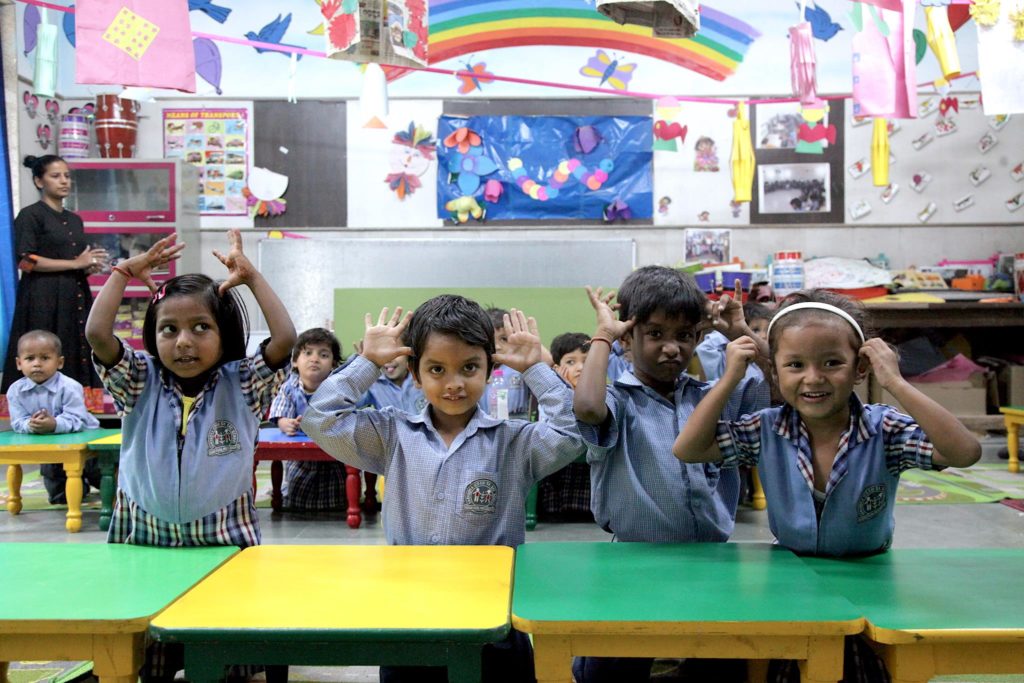When education brings along anxiety

Happiness Curriculum being followed by students at a Delhi school (credit: Happiness Classes Delhi/ Facebook)
Last year India ranked 140 among 156 nations in the World Happiness Report, seven runs lower than in 2018. Recently a survey revealed that students are not happy as they face increasing pressure with rise in the competitiveness in the academic field.
Recently, a query on Quora, a question-answer portal, raised quite a few eyebrows. The query, posted by a parent, asked, ‘‘For my kid, currently in the 5th grade, which coaching institute is best for IIT JEE preparation?” The parent who put up the question, was highly trolled as he had added, “He is a kid and doesn’t know what is good or bad. So parents decide what is better. The IIT tag is very prestigious and it will bring pride to our family.’’
The question and the responses generated put the spotlight on the ineffectiveness of the Indian education system and the undue pressure faced by students, even very young, primary school ones. A survey of Indian schools conducted by the National Council of Educational Research and Training (NCERT) found that only 20 pc of the children were happy in their lives. They attributed the result to the stress of homework and examinations, pressure from parents to attain high marks and pressure in school to maintain proper behaviour and atmosphere in class taking toll on the happiness of the children. The survey also stated that nearly 30 pc students laugh only once in the entire day.
Psychiatrists have also pointed out that academic pressure and the failure to meet the expectations are leading causes of suicide among students. The data compiled by the National Crime Records Bureau (NCRB) showed that 10,159 students died by suicide in 2018 with about 28 student suicides reported every day.
Pressure cooker schools of India
In India there is a conception that being a doctor or an engineer is most prestigious. There are frequent cases where the students are forced to opt for the science stream even if they have the aptitude to do better in the arts or commerce. Then comes another section of people who consider mental and academic capabilities to be hereditary and compare the students in the family on basis of their own examination results.
Students also go under depression when they fail to match the demands of the rigorous education system. As per data available from department of higher education, under the ministry of human resource development (MHRD), 27 students across 10 Indian Institutes of Technology (IITs), considered to be amongst the best in the league of engineering schools in the world, committed suicide between 2014 and 2019.
“The pressure of admission to a good college and hence fetching good marks in boards made me feel pressurised and blank at times that it even curbed my creativity to learn outside of the course. The extreme backlash for not scoring the desired marks in ICSE made me doubt my potentials,” Nabodita, a first-year master’s student of journalism and mass communications tells Media India Group.
“The fact that academics is so much about marks and so little about how we learn, degrades the education system. Running for getting high marks and the constant pressure of scoring better by parents, teachers and also by ourselves, narrows our horizon and curbs our creativity,” she adds.
Her friend Dipannita, a first-year masters student says, “I was lucky to not face the parental pressure regarding academics and it helped me in scoring better marks in my exams. But I have seen students around me succumbing to these anxieties during exams. Some get so tense that they fall sick before exams or start doubting their own preparation.”
Learning is a laughing matter
In response to the survey, the Central Board of Secondary Education (CBSE) and Council for the Indian School Certificate Examinations (CISCE) have decided to hold laughing classes in their affiliated schools once a week from the upcoming session.
Delhi government schools had launched a Happiness Curriculum in 2018 to reinvent the school education sector. The scheme was launched with a focus on imparting education by promoting development of cognition, language, literacy, numeracy and the arts which in turn will aid in the mental development, well-being and happiness of students.
“The AAP government had introduced the Happiness Curriculum to focus on happiness of children. To have better society, it is important to focus on both mental and physical health. I look forward to the decision by CBSE and ICSE boards to introduce the laughing class in its curriculum. But most importantly, it is the stigma of scoring good marks which bothers a student, which needs to be removed,” said Nabodita. Incidentally, the happiness class of the Delhi government attracted the attention of Melania Trump, the First Lady of the United States, during the State visit of President Donald Trump to India. A happiness curriculum and class is something that the US leader could indeed implement back home.









